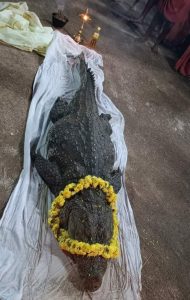Said to be the lone 'vegetarian' crocodile in India, she regularly visited the sanctum sanctorum of the Padmanabha temple. Crocodile experts tell South First that she might have eaten fish in the old lake.

People pay tribute to Babiya, the vegetarian crocodile from Kasargod in Kerala (Supplied)
Even as it grieved, Ananthapura village, located at the edge of Kasargod — the northernmost district of Kerala — seemed proud on Monday, 10 October.
Babiya, said to be the lone ‘vegetarian’ crocodile of India, lived for almost 75 years in the local Sri Anantha Padmanabhaswamy Temple pond, bringing national and international attention to the otherwise sleepy agrarian village.
When she breathed her last late on Sunday night, the whole village was bereaved due to the immense loss, even while witnessing the large-scale attention the death evoked in both social and mainstream media.

The body of Babiya, 75-year-old vegetarian crocodile from Kasargod in Kerala, is kept for public viewing (Supplied)
Many people from north Kerala and the south Canara area of Karnataka, whether they were vegetarian or non-vegetarian, thronged the temple premises from Sunday morning to offer homage to the crocodile who never turned aggressive and posed any threat to the temple devotees.
As soon as the news spread, hundreds reached the temple and paid floral tributes to Babiya. The body was kept in a closed casket for public viewing, and devotees wrapped its body with garlands.
On Monday, the temple witnessed an unprecedented gathering of devotees who recollected past occasions when they spent hours watching Babiya.
According to temple authorities, no non-vegetarian food was served to Babiya in the last 75 years, and the crocodile survived only on the temple’s prasadam, which is entirely vegetarian.
Twice a day, temple staff used to feed the crocodile with two big rice balls. Babiya never attacked even the temple staff, who fed the rice balls right into the mouth of the ‘vegetarian’ crocodile.
When contacted by South First, temple board trustee Mahalingeswara Bhat said he was clueless about how the crocodile landed in the pond.
Nobody knows how she arrived. But the general belief is that she carried a message from the temple’s presiding deity, Lord Padmanabha.
For the devotees and tourists who visited the temple, Babiya was a matter of curiosity. On occasions, devotees took turns feeding her. Some of them made offerings to the crocodile for their wishes.
As part of a daily routine, the temple offered food to her after the morning and afternoon pujas.
Going by a legend, a British soldier shot dead a crocodile in the temple, and within days, Babiya appeared in the temple pond.
“Babiya has never been a threat to anybody. She obediently came out of the pond and ate just the offering to the surprise of all,” said Bhat.
“We have never even seen her eating fish or harming aquatic organisms in the lake,” he added.
Babiya regularly came ashore from her burrow in the temple lake and approached the sanctum sanctorum. The “vegetarian” crocodile reaching the temple for “darshanam” invited a lot of publicity, including on social media.
In the meantime, crocodile experts contacted by South First preferred anonymity but said that Babiya might have eaten fish in the ancient pond.
“She might have eaten the fish in the pond. And might have developed an affinity for rice-based prasadams of the temple,” they said.

May 02, 2024

May 02, 2024

May 02, 2024

May 02, 2024

May 02, 2024

May 02, 2024